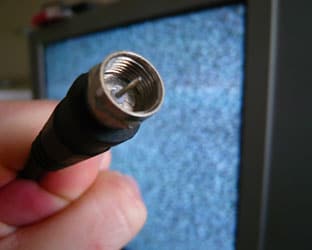WGA STRIKE CENTRAL: DAY 2
The WGA strike is the first walkout by writers since 1988. That work stoppage lasted 22 weeks and cost the industry more than 500 million. What about this time around, in 2007 dollars? TVBR will be running ongoing stories on the estimated economic impact of the WGA strike. The first looks at Bank of America’s Jonathan Jacoby’s analysis. Jacoby emphasizes, like most others, "The Duration of the Strike is the Ultimate Arbiter."
From the report: "Impacts of the strike in the near term should be minimal to the networks-assuming the teamsters do not cause an immediate cessation of production. Late Night TV and Talk shows are the first programs to be impacted, then Daytime television, and finally primetime programming. There should be a minimal impact to industry revenues in the near term as CBS, Disney (DIS), and News Corp. (NWS) network revenue mixes are heavily weighted towards sports and primetime."
Time Warner (TWX) and Viacom have less at risk to the strike – at least initially, said the report. "Last week, CBS and Viacom (VIA) management’s stated that they feel comfortable in their ability to continue production through February. We do believe there is a silver lining: operating costs should see some benefit in the near term due to less production costs on pilots and future episodes."
A prolonged strike would have the greatest impact on CBS. BofA estimates applicable TV & movie theatrical revenues comprise 43% of CBS’s ’08 revenues vs. 21% at DIS, 23% at NWS. (They do not est. Time Warner and Viacom but they will be more protected without broadcast nets, although cable will be impacted as will TV production at TWX).
And like TVBR said last week, BofA stressed NWS and DIS both also have other viable programming options (i.e. leverage cable programming into broadcast), further mitigating the potential impact of this event.
A look a mid season programming shows NWS to be better positioned. CBS, DIS, and NWS are all scheduled to have key primetime programming begin in February ’08, which becomes a big factor in light of the strike. If the strike were to last through Q1 into Q2, BofA, like TVBR, believes NWS is in the best position to handle the strike as its reality program, American Idol, is scheduled to air in February. "While CBS and DIS also have reality programming to air, such as Amazing Race, and Extreme Makeover, however, both are not at all comparable in viewership," the report said.
Tomorrow: Fitch Ratings analysis.
TVBR/RBR observation: We agree, for the short term, a lot depends on the Teamsters. Otherwise, there is not much immediate impact. Late night can muddle through for a while with reruns (they would have been running quite a few reruns around Thanksgiving and Christmas-New Years anyway) and other dayparts won’t be hurt until January or later. Everyone is well aware of the 1988, 22 week walk out in which the strike cost 500 million bucks. Now add 20 years and the dollar number will approach the 1 billion mark if not settled quickly.




